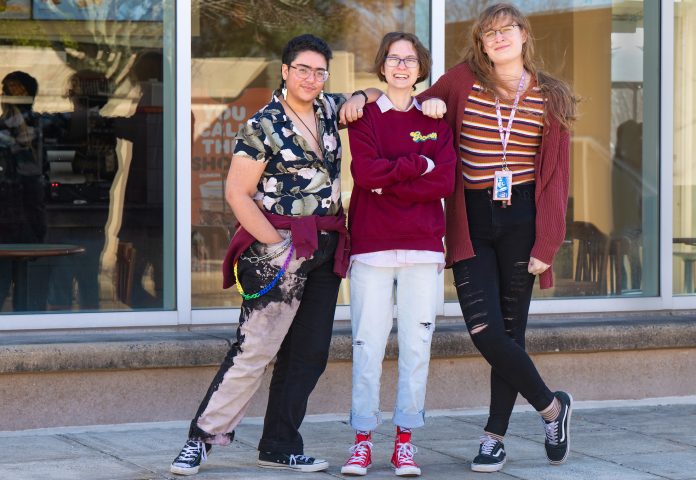For Sara Lareau, a studio art major, Transgender Day of Visibility is about precisely that: being seen.
“It’s a day where I don’t have to hide my identity. I don’t have to hide that I’m trans, and I can be proud,” Lareau said.
Long before Southern was officially declared a Social Justice University, university administrators and faculty prioritized inclusivity for all community members. Front and center is increasing the visibility of marginalized communities on campus, as well as embracing opportunities to elevate diverse experiences and stories through university platforms.
“[Southern’s] transgender students are very active members of our Southern community, and I’m not sure many people know that,” said Jenna Retort, director of the SAGE Center. “Transgender Visibility Day is a chance to raise positive awareness and celebrate all of the good that comes out of the transgender community.”
One initiative organized through the SAGE Center is the Open-Door Closet, which gives transgender students access to gender-affirming clothing free of charge.
As a university, Southern has implemented a new pronoun and gender identity policy that gives students the chance to select their preferred gender and pronouns at the point of enrollment. Once listed, faculty are alerted to a student’s preferred gender identity and pronouns at the start of each semester.
It’s a system that is still being worked on, according to university officials, with the goal of eliminating “deadnaming” – the act of referring to a transgender or non-binary person by a name they used prior to transitioning, such as their birth name.
“Sharing someone’s deadname is one of the highest breaches in privacy and personal history anyone could do,” explains Lareau.
The decision to come out as transgender can be a challenging and an at times treacherous road to navigate. Transgender students face a higher risk of marginalization, food insecurity, homelessness, and violence than non-transgender students, says Retort.
Combating these challenges on college campuses is often seen as an uphill battle, and one directly tied to the larger sociopolitical context. Perhaps that’s why support within the transgender community has shown itself to be especially tight-knit at Southern.
Sam Gontazr, a sophomore majoring in communication sciences and disorders, said that while it’s important to recognize and celebrate the accomplishments of the trans community, Transgender Day of Visibility is more about “trans and gender-queer [folks] coming together and caring for each other.”
Theater major Samhain Perez adds that a better understanding of the transgender community could lead to a more inclusive and tolerant campus where transgender students feel more visible.
“Things like training and mandatory learning modules similar to Title IX training could give a simplified idea of who the trans community is and how to support them,” said Perez. “Transgender Day of Visibility reminds me that there is still more to be done, although we have progressed. I look forward to doing my [part in that] work.”


